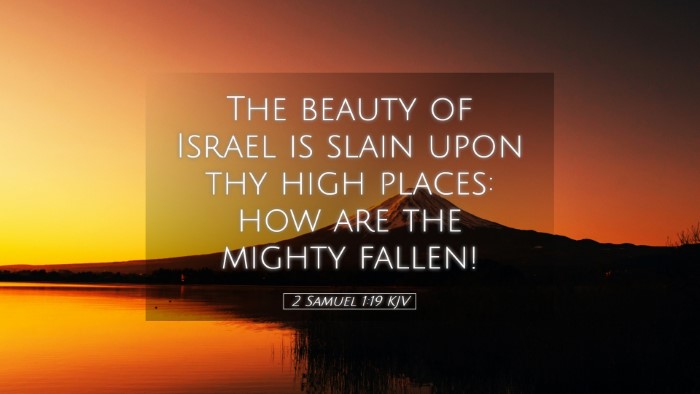2 Samuel 1:19 - Commentary and Insights
Verse: "The beauty of Israel is slain upon thy high places: how are the mighty fallen!"
Introduction
This poignant verse comes from the lament of David upon hearing of Saul's death and the defeat of Israel in battle. It encapsulates the deep sorrow and tragedy of losing great leaders and the spiritual downfall of a nation. This commentary draws on the insights of Matthew Henry, Albert Barnes, and Adam Clarke to explore the depth and implications of this passage.
Contextual Background
To fully grasp the significance of David's lamentation, one must consider the historical and cultural context of the verse. Saul, as Israel's first king, had a turbulent reign marked by jealousy and conflict with David. David, although a rival in the eyes of Saul, expresses profound grief over the loss of Saul and Jonathan, emphasizing a deep sense of loyalty and respect for their roles in Israel.
Key Themes
- The Beauty of Israel: This phrase signifies not only the physical attractiveness of the land but more importantly, refers to the dignity and glory of the nation, represented by its leaders.
- The Mighty Fallen: The lament highlights the downfall of those who were esteemed and honored, pointing to the fragility of human strength and the inevitability of death.
Commentary Insights
Matthew Henry's Perspective
Matthew Henry emphasizes the sorrow reflected in David's words. He notes that "the beauty of Israel" refers specifically to Jonathan and Saul, signifying their roles as the leaders of Israel. Henry poignantly states that although Saul was an imperfect king, David still recognizes his place as the ruler appointed by God, thus demonstrating David's heart of respect and recognition of God's anointing.
Albert Barnes' Commentary
Albert Barnes further elaborates on the implications of the phrase "how are the mighty fallen!" He explains that such a phrase reveals the deep calamity that has befallen Israel through Saul's defeat. Barnes points out that the fall of mighty men serves as a solemn reminder of the transitory nature of power and authority. His analysis invites theologians to reflect on the consequences of leadership failure within the broader scope of divine justice and judgment.
Adam Clarke's Insights
Adam Clarke's commentary delves into the poetic structure of the lament. He argues that David's expression serves as an acrostic of grief. Clarke illustrates the lament as not merely a reflection of sorrow but as a call to remembrance of the achievements and qualities of Saul, despite his faults. Clarke remarks that through this lamentation, David embodies humility and a recognition that even flawed leaders deserve honor for their service to God and country.
Theological Reflections
This lamentation offers rich theological reflections for pastors and theologians. It serves as a foundation for recognizing the interplay between divine providence and human agency:
- The Sovereignty of God: Even in the tragedy of loss, God's sovereign hand works out His purposes, reminding believers of His ultimate authority over human affairs.
- Grieve with Hope: David's lamentation is an invitation for believers to grieve losses but also to place their trust in God's continued plan of redemption.
- Righteous Leadership: This verse serves as a reminder of the responsibilities of leadership and the impact of moral character in guiding a nation.
Practical Application
The lessons extracted from 2 Samuel 1:19 resonate deeply in modern contexts. Here are some practical applications for today's leaders and believers:
- Honor and Respect: In our discourse about leaders, even those fallen from grace, we ought to approach with a heart of respect for their contributions and roles.
- Reflect on Leadership: Leaders should examine their hearts and actions, seeking to lead with integrity, as their influence extends beyond their lifetimes.
- Community Grieving: Churches and communities should create spaces to grieve collective losses, reflecting on their implications and reaffirming shared hope in Christ.
Conclusion
In conclusion, 2 Samuel 1:19 encapsulates the devastation brought by the loss of significant leaders in Israel, reflecting a universal truth about human frailty and the fleeting nature of life. The insights from Matthew Henry, Albert Barnes, and Adam Clarke collectively deepen our understanding of this verse, prompting reflection on leadership, mortality, and divine sovereignty. For pastors, theologians, and students of the Bible, this passage challenges us to honor those who lead and to remember the weight of our own responsibilities in our calling.


